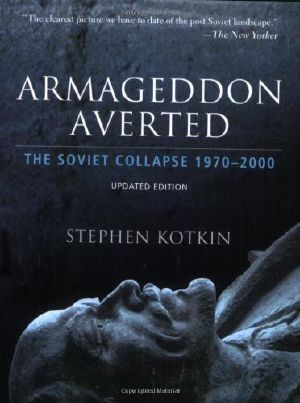Armageddon Averted · The Soviet Collapse, 1970-2000

- Authors
- Kotkin, Stephen
- Publisher
- Oxford University Press, USA
- Tags
- non-fiction , politics , history
- ISBN
- 9780195368635
- Date
- 2001-01-01T00:00:00+00:00
- Size
- 2.50 MB
- Lang
- en
Featuring extensive revisions to the text as well as a new introduction and epilogue--bringing the book completely up to date on the tumultuous politics of the previous decade and the long-term implications of the Soviet collapse--this compact, original, and engaging book offers the definitive account of one of the great historical events of the last fifty years.
Combining historical and geopolitical analysis with an absorbing narrative, Kotkin draws upon extensive research, including memoirs by dozens of insiders and senior figures, to illuminate the factors that led to the demise of Communism and the USSR. The new edition puts the collapse in the context of the global economic and political changes from the 1970s to the present day. Kotkin creates a compelling profile of post Soviet Russia and he reminds us, with chilling immediacy, of what could not have been predicted--that the world's largest police state, with several million troops, a doomsday arsenal, and an appalling record of violence, would liquidate itself with barely a whimper. Throughout the book, Kotkin also paints vivid portraits of key personalities. Using recently released archive materials, for example, he offers a fascinating picture of Gorbachev, describing this virtuoso tactician and resolutely committed reformer as "flabbergasted by the fact that his socialist renewal was leading to the system's liquidation"--and more or less going along with it.
At once authoritative and provocative, Armageddon Averted illuminates the collapse of the Soviet Union, revealing how "principled restraint and scheming self-interest brought a deadly system to meek dissolution."
Acclaim for the First Edition:
"The clearest picture we have to date of the post-Soviet landscape."--The New Yorker
"A triumph of the art of contemporary history. In fewer than 200 pagesKotkin elucidates the implosion of the Soviet empire--the most important and startling series of international events of the past fifty years--and clearly spells out why, thanks almost entirely to the 'principal restraint' of the Soviet leadership, that collapse didn't result in a cataclysmic war, as all experts had long forecasted."-The Atlantic Monthly
"Concise and persuasive The mystery, for Kotkin, is not so much why the Soviet Union collapsed as why it did so with so little collateral damage." --The New York Review of Books
From Library JournalThe director of Russian studies at Princeton and a published scholar in the field of Soviet studies, Kotkin has written a lively and provocative work on a subject that has already attracted much scholarly attention. His central question is, however, his own: why didn't Soviet elites defend their Union, using their vast military arsenal to bring about a cataclysmic super-Yugoslavia in the dying USSR? How could such a massive police state have died so quietly? He points in response to those same elites who, for over 30 years, constituted themselves as vast "loot chains," preferring to plunder their country of its wealth than risk losing everything in large-scale war. Through the medium of the Union republics, local elites led the charge for their own aggrandizement, thus "cashier[ing] the Union." As he delivers telling jabs, Kotkin spares no one neither Soviet politician-gangsters nor arrogant U.S. administrators and academics. This is a much more readable and lively monograph on the Soviet collapse than others, such as Michael McFaul's Russia's Unfinished Revolution (Cornell Univ., 2001), which has a more purely academic appeal. Kotkin's book should attract both the academic and the informed general reader. Robert Johnston, McMaster Univ., Hamilton, Ont. The director of Russian studies at Princeton and a published scholar in the field of Soviet studies, Kotkin has written a lively and provocative work on a subject that has already attracted much scholarly attention. His central question is, however, his own: why didn't Soviet elites defend their Union, using their vast military arsenal to bring about a cataclysmic super-Yugoslavia in the dying U.S.S.R.? How could such a massive police state have died so quietly? He points in response to those same elites who, for over 30 years, constituted themselves as vast "loot chains," preferring to plunder their country of its wealth than risk losing everything in large-scale war. Through the medium of the Union republics, local elites led the charge for their own aggrandizement, thus "cashier[ing] the Union." As he delivers telling jabs, Kotkin spares no one neither Soviet politician-gangsters nor arrogant U.S. administrators and academics. This is a much more readable and lively monograph on the Soviet collapse than others, such as Michael McFaul's Russia's Unfinished Revolution (Cornell Univ., 2001), which has a more purely academic appeal. Kotkin's book should attract both the academic and the informed general reader. Robert Johnston, McMaster Univ., Hamilton, Ont. Copyright 2001 Reed Business Information, Inc.
From The New YorkerIn 1995, Kotkin, a professor of history at Princeton, published "Magnetic Mountain," a groundbreaking study of Stalinist socialism as it developed in the gargantuan steel town of Magnitogorsk, in central Russia. In his portrayal of that perverse utopia, the author displayed the skills of a dogged reporter and a meticulous archivist. The same strengths are evident in this brief, lucid study, which draws upon dozens of obscure Kremlin memoirs, provincial records, and interviews with top-level officials and oligarchs to provide us with the clearest picture we have to date of the post-Soviet landscape. Kotkin effectively describes how what was called "reform" was actually a continuing freefall collapse; he also expertly depicts the lingering networks and habits of the Soviet era, and how they have formed a post-imperial world in all its corrupt splendor. Copyright © 2005 The New Yorker